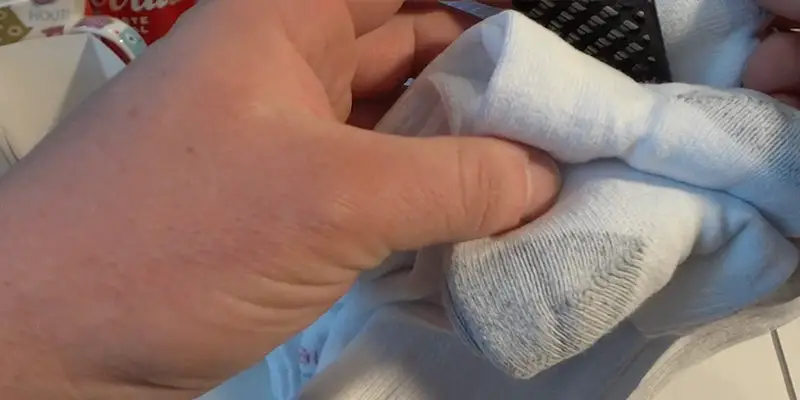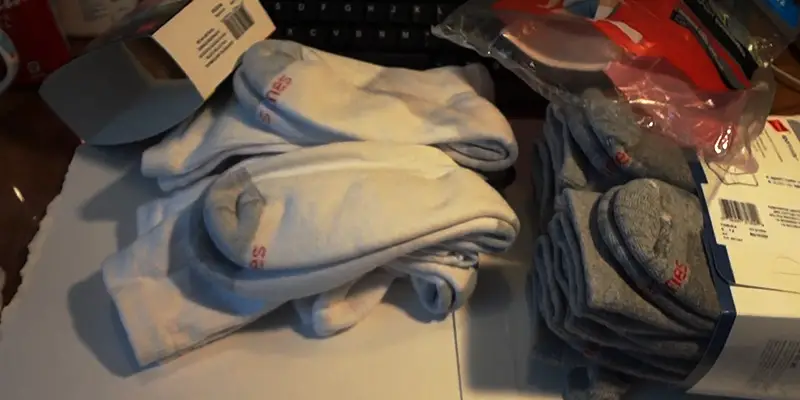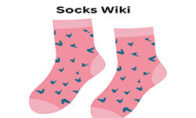Hi, I'm Christopher Bevans, the creator of SocksWiki.com. With a background in fashion design and a passion for innovation, I’m here to share my knowledge on socks from troubleshooting tips to detailed buying guides. I believe the right pair of socks can make all the difference, and through this site, I aim to help you find the perfect fit for every occasion.
Hi, I'm Christopher Bevans, the creator of SocksWiki.com. With a background in fashion design and a passion for innovation, I’m here to share my knowledge on socks from troubleshooting tips to detailed buying guides. I believe the right pair of socks can make all the difference, and through this site, I aim to help you find the perfect fit for every occasion.
Yes, polyester socks are a fantastic choice for many, offering durability, moisture-wicking properties, and affordability. They are especially popular among athletes and those with an active lifestyle due to their ability to keep feet dry and comfortable.
Unlike cotton, polyester retains its shape and dries quickly, making it ideal for various weather conditions. However, while polyester socks excel in functionality, some people prefer natural fibers for their softness and breathability.
Understanding your specific needs whether for sports, daily wear, or cold weather can help you decide if polyester socks are the right fit for you. Let’s dive deeper into their pros and cons.
What Are Polyester Socks?
Polyester socks are hosiery made from polyester, a synthetic fiber derived from coal, air, water, and petroleum.
In the history of socks, these socks are known for their durability, moisture-wicking properties, and quick-drying capabilities.
Polyester fibers are lightweight and can be designed to be breathable, making them suitable for various activities, including sports and everyday wear.
They are also affordable and come in a wide range of colors and patterns due to the material’s versatility in dyeing.
However, polyester socks can sometimes retain odors and are less breathable compared to natural fibers like cotton or wool, which can impact comfort.
Why Are Polyester Socks Good?
Polyester socks are good because they offer numerous benefits.
Here are the reasons why are Polyester socks good:
- Moisture Wicking: They effectively pull moisture away from the skin, keeping feet dry.
- Quick Drying: Polyester dries faster than cotton, reducing dampness and odor.
- Durability: They are more resistant to wear and tear compared to natural fibers.
- Comfort: Soft and lightweight, providing a snug fit without bulkiness.
- Affordability: Generally cost-effective and widely available.

Advantages/Benefits of Polyester Socks
Polyester socks have gained popularity due to their unique blend of qualities that cater to various needs and preferences.
Knowing the advantages of polyester socks can help consumers make informed choices that best suit their lifestyle and activities.
Here are the numerous benefits and advantages of using polyester socks:
1. Durability
Polyester is renowned for its durability. Unlike natural fibers, which can wear out or degrade over time, polyester maintains its integrity through repeated use and washing.
This makes polyester socks a long-lasting investment, particularly beneficial for those who engage in activities that put a lot of stress on their socks, such as sports, hiking, or everyday wear.
The fiber’s resistance to stretching and shrinking also ensures that the socks retain their shape and fit even after prolonged use.
2. Moisture-Wicking Properties
One of the standout features of polyester is its excellent moisture-wicking capability. Polyester fibers are designed to pull moisture away from the skin and disperse it across the fabric’s surface, where it can evaporate quickly.
This keeps feet dry and reduces the risk of blisters, fungal infections, and other moisture-related foot problems.
For athletes and individuals who sweat heavily, this property is particularly advantageous, as it enhances comfort and performance.
3. Quick-Drying
Polyester dries significantly faster than many natural fibers. This quick-drying attribute is invaluable for those who need their socks to be ready for use again shortly after washing.
It is also beneficial in outdoor settings or travel scenarios where drying facilities may be limited.
The ability to dry quickly also contributes to the moisture-wicking effectiveness, further ensuring that feet stay dry and comfortable.
4. Lightweight and Breathable
Despite being a synthetic material, polyester can be engineered to be lightweight and breathable.
Advanced manufacturing techniques allow for the creation of polyester fabrics that promote air circulation, keeping feet cool even during intense physical activities or in warm weather.
The lightweight nature of polyester socks adds to the overall comfort, making them suitable for long periods of wear without causing discomfort or fatigue.
5. Affordability
Polyester is generally more cost-effective than many natural fibers. This affordability makes polyester socks accessible to a wide range of consumers, from budget-conscious shoppers to those looking for high-performance athletic gear.
The cost-effectiveness does not come at the expense of quality, as modern polyester socks are designed to provide superior performance and comfort.
6. Versatility in Design
Polyester’s ability to be easily dyed and printed makes it an excellent choice for socks with a wide variety of colors, patterns, and designs.
This versatility in design allows consumers to choose from an extensive range of options to match their personal style, preferences, and needs.
Whether it’s for casual wear, sports, or formal occasions, polyester socks can cater to all.
7. Resistance to Pilling and Fading
Polyester socks are highly resistant to pilling, which is the formation of small balls of fiber on the fabric’s surface. Pilling can make socks look worn and reduce their aesthetic appeal.
Polyester’s resistance to pilling ensures that the socks maintain a neat and tidy appearance even after many washes.
Additionally, polyester is less prone to fading, meaning that the colors and patterns remain vibrant and attractive over time.
8. Elasticity and Shape Retention
Polyester fibers possess a natural elasticity, which allows socks to stretch and conform to the shape of the foot while providing a snug fit.
This elasticity also helps the socks to retain their shape, preventing them from becoming loose or misshapen.
The consistent fit enhances comfort and support, making polyester socks suitable for various activities, including those that require precise foot movements.
9. Hypoallergenic Properties
Polyester is generally considered hypoallergenic, meaning it is less likely to cause allergic reactions compared to some natural fibers.
This makes polyester socks a good choice for individuals with sensitive skin or allergies.
The smooth texture of polyester can also minimize irritation, ensuring a comfortable wearing experience.
10. Stain Resistance
Polyester has a natural resistance to stains, which is an advantage for maintaining the appearance of socks.
Stain-resistant properties mean that polyester socks are easier to keep clean and looking new, even after exposure to dirt, mud, or spills.
This feature is particularly beneficial for children’s socks, work socks, and athletic socks that are prone to getting dirty.

Disadvantages/Drawbacks of Polyester Socks
While polyester socks offer numerous advantages, such as durability, moisture-wicking properties, and affordability, they also come with several drawbacks that consumers should consider.
Knowing these disadvantages is crucial for making an informed choice that best suits individual needs and preferences.
Below, we explore what are the disadvantages of polyester socks:
1. Odor Retention
One of the primary drawbacks of polyester socks is their tendency to retain odors. Polyester fibers are not as effective as natural fibers in resisting bacterial growth, which can lead to unpleasant smells.
When feet sweat, the moisture can combine with bacteria, creating odors that are difficult to eliminate even after washing.
This issue is particularly noticeable in athletic or everyday socks worn for extended periods.
2. Less Breathability Compared to Natural Fibers
Although polyester can be engineered to be breathable, it generally does not match the breathability of natural fibers like cotton or wool. Natural fibers allow for better air circulation, which helps keep feet cool and dry.
Polyester’s limited breathability can lead to a build-up of heat and moisture, resulting in discomfort, especially in warm weather or during intense physical activities.
3. Environmental Concerns
Polyester is a synthetic material derived from petroleum, raising significant environmental concerns.
The production process of polyester is energy-intensive and contributes to pollution. Additionally, polyester is not biodegradable, leading to long-term waste issues.
Discarded polyester socks can persist in landfills for hundreds of years, contributing to environmental degradation.
Although recycled polyester is becoming more common, it does not fully address the environmental impact associated with synthetic fibers.
4. Static Build-Up
Polyester is prone to accumulating static electricity, which can cause discomfort and inconvenience.
Static build-up can make socks cling to the skin or other fabrics, leading to an unpleasant wearing experience.
This issue is less prevalent in natural fibers and can be particularly bothersome in dry climates or during colder months when static electricity is more common.
5. Allergic Reactions and Skin Sensitivity
Some individuals may experience allergic reactions or skin sensitivities when wearing polyester socks.
The synthetic nature of polyester can irritate sensitive skin, leading to redness, itching, or discomfort.
While many people can wear polyester without issues, those with sensitive skin or specific allergies may prefer natural fibers like cotton or wool, which are generally gentler on the skin.
6. Comfort and Feel
The comfort and feel of polyester socks can be less natural compared to those made from cotton or wool.
Polyester does not provide the same level of softness and natural texture, which can affect overall comfort.
Some people find polyester socks to be less cozy and more synthetic-feeling, which can be a significant drawback for those who prioritize the tactile experience of their clothing.
7. Heat Retention
Polyester can retain heat, making it less suitable for warm weather or high-temperature environments.
While it can wick moisture away from the skin, the material itself does not have the same cooling properties as natural fibers.
This can lead to overheating and discomfort, particularly during summer months or vigorous activities.
8. Less Effective in Extreme Cold
In extreme cold conditions, polyester socks may not provide the same level of warmth and insulation as wool socks.
Wool has natural insulating properties that help retain heat, making it ideal for cold weather.
Polyester, while providing some degree of warmth, does not match the insulating capabilities of wool, which can be a disadvantage for those needing extra warmth in cold climates.
9. Chemical Treatments
To enhance the performance of polyester socks, manufacturers often treat the fabric with various chemicals, such as antimicrobial agents to combat odor or coatings to improve moisture-wicking properties.
These chemical treatments can sometimes cause skin irritation or allergic reactions in sensitive individuals.
Additionally, the long-term environmental impact of these chemicals is a concern, as they can leach out during washing and contribute to water pollution.
FAQs
Are Polyester Socks Good for Feet?
Yes, polyester socks are good for feet due to their durability and moisture-wicking properties, but they may cause irritation for those with sensitive skin.
Are Polyester Socks Good for Walking?
Yes, polyester socks are suitable for walking as they keep feet dry and are durable, though extra cushioning and support may enhance comfort.
Are Polyester Socks Good for Running?
Yes, polyester socks are excellent for running because they wick moisture, dry quickly, and are lightweight, reducing the risk of blisters.
Are Polyester Socks Good for Winter?
No, polyester socks are not good for winter rather wool or wool-blend socks are better for extreme cold.
Are Polyester Socks Good for Sweaty Feet?
Yes, polyester socks are good for sweaty feet due to their moisture-wicking ability, keeping feet dry and comfortable.
Are Polyester Socks Good for Hiking?
Yes, polyester socks are good for hiking because they wick moisture, dry quickly, and offer durability and comfort on long trails.
Are Polyester Socks Good for Your Feet?
Yes, polyester socks are good for your feet because they provide moisture-wicking, breathability, and durability, helping to keep feet dry and comfortable.
Are Polyester Socks Good for Summer?
Yes, polyester socks are good for summer as they wick away sweat, dry quickly, and help keep your feet cool and comfortable.
Final Thought on Are Polyester Socks Good or Not?
Polyester socks offer a range of benefits that make them a practical choice for many individuals.
Their durability, moisture-wicking properties, quick-drying capabilities, and affordability cater to everyday wear, sports activities, and various weather conditions.
However, potential drawbacks such as odor retention, less breathability compared to natural fibers, and environmental concerns should be considered.
Ultimately, the suitability of polyester socks depends on personal preferences, activities, and sensitivity to synthetic materials.
By weighing these factors, individuals can make informed decisions to ensure their socks meet both their performance needs and comfort standards.
Also Read- What is the Best Material for Socks?

Hi, I'm Christopher Bevans, the creator of SocksWiki.com. With a background in fashion design and a passion for innovation, I’m here to share my knowledge on socks from troubleshooting tips to detailed buying guides. I believe the right pair of socks can make all the difference, and through this site, I aim to help you find the perfect fit for every occasion.
- Latest Posts by Christopher Bevans
-
How to Get Rid of a Sock Tan Line Naturally & Quickly
- -
What Socks to Wear With Grey Suit and Brown Shoes
- -
What Socks to Wear With Dress Shoes in 2026?
- All Posts


